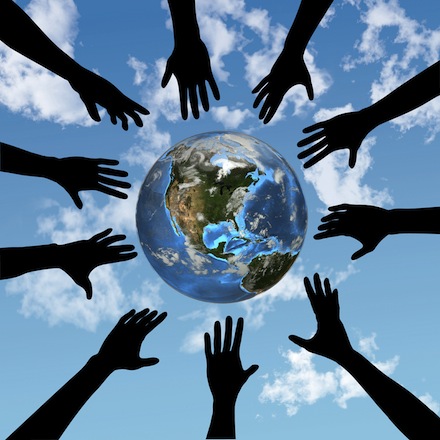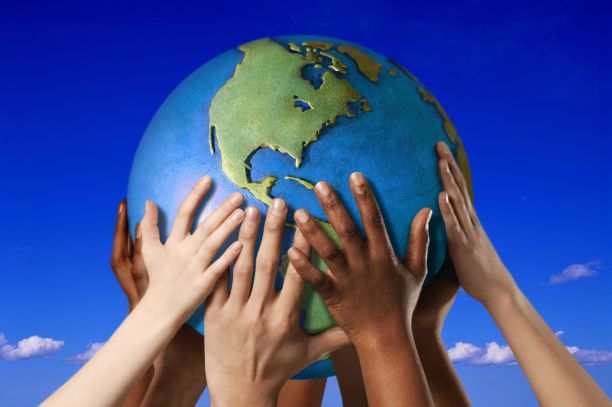Is seeking status an immutable aspect of human nature, as social commentators assume? Or is status seeking, like tribalism/nationalism, something that a modicum of self-knowing and right education can affect in the global society?
 Taking the pursuit of status as a given of human existence means resigning to the worst aspects of human nature and capitalism. It also contributes to rampant spiritual deadening, which parallels man’s rapacious destruction of the ecosphere.
Taking the pursuit of status as a given of human existence means resigning to the worst aspects of human nature and capitalism. It also contributes to rampant spiritual deadening, which parallels man’s rapacious destruction of the ecosphere.
Homogenization has not become a commonplace, but remains an unaddressed fact. What has become a commonplace is the surface observation that ‘the global rich inhabit one country, the global middle class another, the global poor a third.’ The real inward and intellectual work begins with delving into the economic disparity and spiritual sameness that globalization is greatly exacerbating.
Shallow-minded commentators have become synonymous with shallow-minded tourists, both seeking something ‘different.’ They don’t see that the very seeking of status and difference through slow-aged liqueurs and hand-sewn fabrics or whatever attests to sameness both before and after their quest for difference.
In other words, the status-driven pursuit of difference exemplifies an inward, ‘the world is flat’ sameness that is growing exponentially. Indeed, the need to show through material displays one’s difference only aggravates one’s spiritual emptiness.
The cultural and character formation of peoples throughout the ages has formed the soil of humanity. But as with nature itself, the present race to the bottom is eroding core diversity. Material indicators of wealth are disconnected from this internal vortex; indeed, the needless pursuit of status along the lines of the American dream has become a driver of the flattening of people and peoples, not to mention the earth.
One of the favorite tricks of deniers, be they climate-change deniers or the loss of human diversity deniers, is to say, ‘it was ever so.’ Climate-change deniers are cruder; they merely pigheadedly or politically continue to insist against overwhelming evidence that man is not, in the ‘Anthropocene Age,’ disastrously impacting the ecosphere in innumerable ways.
Human diversity deniers are more clever. They point to this or that indicator of material increase or disease decrease and say that progress is being made, just not in a linear fashion. Neither asks the question: Is humankind as a whole on an accelerating disastrous course?
Yes, but that doesn’t imply the resignation of ‘it is what is what it is,’ or ‘what can I as one person do?’ On the contrary, emotionally perceiving the enormity of the fact generates enormous urgency for radical change,  within and beyond oneself. The very perception of the total crisis of consciousness of humanity diminishes self-centered activity, which is what status seeking is at bottom.
within and beyond oneself. The very perception of the total crisis of consciousness of humanity diminishes self-centered activity, which is what status seeking is at bottom.
But how do status seeking and the disastrous course of humankind go together? The difference between billions of people seeking a decent standard of living and billions of people seeking status is the difference between ecological and spiritual viability, and collapse.
As with individuals, peoples can inwardly perish even as they outwardly live on. That is precisely what happened in America, when the people perished a generation ago after the ‘good Gulf War.’
Though media and political elites are loath to acknowledge it, ordinary people feel the deadness and the utter lack of vitality in what was once the most vital nation on earth. They know something essential has died, and many are beginning to ask: What kind of life do I want to lead in such a culture? What kind of culture do we want to create now that the old one has died?
The question and the issue have moved way beyond America—despite or because of how perniciously influential American culture continues to be in the world. After all, if peoples can perish, then so can sentient, potentially sapient species. I feel the cosmos has a great deal invested in its sentient creatures, wherever they evolve. Out of millions of earth-like planets in our galaxy, there may be only a few hundred sentient, potentially intelligent species.
In short, there are a finite number of chances to change course, and turn toward wholeness rather than continue on the path of fragmentation.
Is humanity at that last crossroads now? I don’t know, but need to presume so to respond to the urgency of the crisis of consciousness we all face.
Some say that awareness that has changed things, that is a force multiplier and motivator for ‘the ache of status,’ irrespective of national boundaries. But that is giving awareness a bad name. The global society has not rendered the classes of capitalism—rich, poor and middle class—into fixed assumptions of human nature. So let’s not mistake awareness for information, or the envy of status seeking for human advancement.
What was once noble through duty to one’s country has become ignoble in service to humanity. The dignity and advancement of the individual now is in his or her commitment to humanity as a whole.
Martin LeFevre

